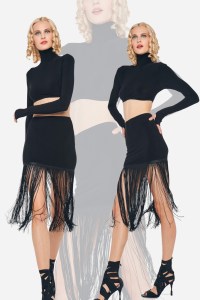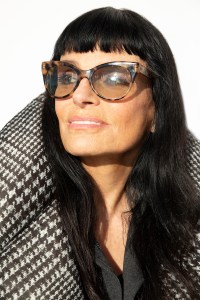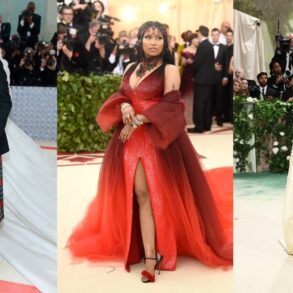Generations of independent designers have set out to run privately owned businesses, but Norma Kamali is among the few who have withstood the industry’s turbulence on her own terms.
Now 78, the New Yorker is launching a podcast Tuesday that is aptly named “Invincible Threads.” Fashion, music, AI and longevity will be the focal points. But that isn’t her only major undertaking: next month, Kamali will be getting married in Abu Dhabi.
Needless to say, retirement is not on the horizon.
She said her interest in AI is part of a big-picture strategy. She completed a MIT course in generative AI a few months — the only designer student amidst a sea of mostly coders. With an archive of 56 years’ worth of designs all by one designer, Kamali is keen to use that as “an opportunity for the brand to live on.”
Reached in the sprawling 17,000-square-foot space that she moved into last year on Greenwich Street, the designer had just shown Purdue dance members video clips (during which they were dressed in her line) of one of their performances on a massive LED screen that covers one wall. “I love dancers. They are just so dedicated, but it’s a profession that does not get enough appreciation. It’s painful,” she said.
After nearly four decades of being based on West 56th Street, Kamali gave up what was an unfathomable New York City lease — 99 years — and was ready to make the move downtown. The additional space wasn’t the only incentive for relocating. “Hello, 56th Street,” she said sardonically, adding the neighborhood is “just so human.”
Convinced that fashion is about to go through “the biggest change” in her lifetime, Kamali said the decades-old practices of doing things the same way are a good place to start. There is more to consider than fast-moving concepts like trends and colors, Kamali said.
“Clothing, bottom line, is about how they make people feel in them. In our business, we underestimate how a jacket really hugs the body or how clothes embrace a human being in different ways that can change a person’s whole psyche,” she said. “Fashion really has deep meaning and consequences in people’s lives. Understanding fashion in not just clothes will give us [designers] ideas about how we think, who we are, what we do as an industry and what people think about us.”

Norma Kamali, spring 2024
Courtesy of Norma Kamali
Gen Z, for example may not have an interest in shopping or the types of clothes that are being designed now, she said. They also aren’t interested in working for large corporations and aspire to create and be creative in their lives, she added, basing that on what she has heard from them. “I love their perspective and it’s quite different from what we’re doing,” she added.
With six livestream cameras in her expansive space, Kamali will also post presentations about creating fashion, developing patterns, conceptualizing and more. Fashion presentations will be held there, too. “With my 56 years of experience, I have a lot going on in my head that should be shared,” she said, adding that it will even be used to make sweet potato ice cream or whatever else she is up to.
Kamali believes that AI can personalize fashion like nothing else by catering to and connecting with specific types of customers, as well as for social media and other tasks. The designer put AI to the test after receiving an outline for a film about her that was “very impressive but had a preconceived notion about what they wanted to do.” The AI synopsis was “the most relevant description of who she is and what she does,” she said, and the film’s suggested title was “Invincible Threads.” (In 2021, she published “Norma Kamali: I Am Invincible.”)

Norma Kamali
Photo Courtesy Norma Kamali
As for the argument that AI dehumanizes the workforce, will replace jobs and erode humanity, Kamali said, “Clearly, there are bad actors, who will do bad things. But AI is not creative. Fashion is about creativity. I think of AI as more mechanical. It can’t create anything for you or invent anything with a spirit. If that’s what you do, you can’t be scrapped,” she said. “I view it as an incredible source of inspiration and opportunity. Now some jobs will go away like an assistant’s job. But it will open up tons of jobs for a new type of coding.”
The podcast can be found on her site starting Tuesday. People can also join in virtually to the noontime workouts of varying intensities that are held in her space each workday with everyone — “people in the sample room to the sales teams and the cleaning crew. It’s so bonding and it’s part of the workday. People get paid to work out for an hour. I think it’s important and am so happy to see how fit everyone is,” Kamali said.
The podcast’s first guests include the designer Rick Owens, whom Kamali chatted with about staying independent. “It’s a very hard thing to do. But that’s how much the two of us believe in having a creative life, where there isn’t a committee telling you what to design. It is what you want to do. We both want that so desperately in our lives that we barrel through,” she said.
Having always been a what’s-next thinker, Kamali was professing the health benefits of olive oil (and selling it, too) long before the wellness economy became a $4.9 trillion entity in 2020. One of her MIT professors will address AI in another episode and a scientist will discuss how stem cells will potentially revolutionize health care and how we take care of ourselves.
“Very proud” as she is of her buisiness’ numbers, she declined to pinpoint sales. “What’s important is I’ve been in business for 56 years. I’ve never had a partner except for my early years with Eddie Kamali (her former husband). I don’t owe any money and I’m able to fund my new ventures.”
Like any career, there have been roadblocks. After leaving Kamali with $98 to her name in the mid ’70s, the designer said she did not know what she was going to do or how she was going to do it. “I didn’t even have curtains in my apartment. I just left and never told anybody about the stress that I was under,” she said. “I was in my sample room morning, noon and night. That was my safe space.”
“Embarrased to death by what had happened,” Kamali said she had to tell people what her life was then like. Unaware that people had recognized what she was doing in fashion and thought she had talent, the designer said some loaned her money and helped her open a Midtown store. “It was an extremely special time in my life, because the generosity of these people gave me a new life in 1976.”
A few years prior, Kamali had used a pioneering NASA principle for containing heat to create her sleeping bag coat — essentially an oversize puffer that involved sewing together two coats with a pocket of air between them. Heat from the body exchanges with the cold from the outside. “Obviously, it works because so many people are still buying them,” she said — and the many knockoffs, too. “Well, that’s all good.”
What’s also good is her engagement to Marty Edelman, whom she describes as “an amazing guy and we really have a lot of common belief systems.“ When the designer turned 65, Ian Schrager, whom Kamali has been friends with since he opened Studio 54, said he had a guy for her and made the introduction.
Her first marriage to Kamali started at 19 — “so smart” — she said facetiously, before noting marriage was the way for women to leave the house at that time. “When we started to become adults, our interests and outlooks on life were very different.”
They were teamed up for a dance contest by her friend, who was New York City’s first club DJ. When her friend told her there would be a $500 prize, Kamali recalled, “I need art supplies. Get me on that dance floor.” She and Kamali won the loot the first night and the following night, she said with a laugh.
Fast-forward to today, Edelman is “an international guy, who spends a lot of time in the Middle East,” she said. “He is smart as hell. And I’m a lucky person,” Kamali said. Their wedding will be held in November in Abu Dhabi’s Abraham Family House, which has a church, synagogue and a mosque. Given the religious site, Kamali said the wedding dress that she will design will be respectful of that fact. “Obviously, I’m not going to wear a bridal gown and walk down the aisle with a bouquet. I have to come up with something.”
As a Maronite Christian marrying a Jewish man, Kamali said the ceremony will be held in the extraordinary plaza and garden with a priest, a rabbi and an imam. A New York gathering will be held at a later date. Schrager is “taking full responsibility” for the union, so much so that he’s “a little obnoxious about it,” Kamali said. “He is so thrilled, because he has such an incredible relationship with a wonderful person. He is just so happy for us that we found each other. And we’re just so grateful to him.”
Asked about any concrete plans for a movie, Kamali said, “it’s too early.”
This post was originally published on this site be sure to check out more of their content.






